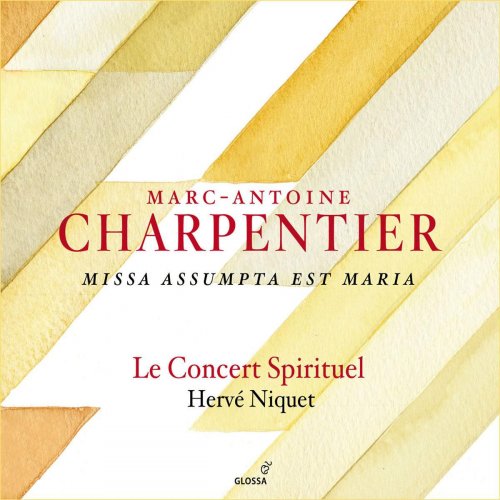
Hervé Niquet - Charpentier, M.-A.- Missa Assumpta Est Maria (2009)
BAND/ARTIST: Hervé Niquet
- Title: Charpentier, M.-A.- Missa Assumpta Est Maria
- Year Of Release: 2009
- Label: Glossa
- Genre: Classical
- Quality: FLAC (tracks)
- Total Time: 60:11 min
- Total Size: 313 MB
- WebSite: Album Preview
Tracklist:
1. Kyrie: Sinfonie devant le premier
2. Kyrie: Premier
3. Kyrie: Sinfonie devant le Christe
4. Kyrie: Christe
5. Kyrie: Sinfonie devant le deuxieme
6. Kyrie: Deuxieme
7. Gloria: Gloria in excelsis Deo
8. Gloria: Et in terra pax hominibus
9. Gloria: Domine Deus, Rex caelestis
10. Gloria: Qui tollis pecatta mundi
11. Gloria: Quoniam tu solus sanctus
12. motet a voix seule sans accompagnement, H. 361, "Sancti Dei per fidem"
13. Credo: Credo in unum Deum
14. Credo: Patrem omnipotentem
15. Credo: Et in unum Dominum
16. Credo: Et incarnatus
17. Credo: Crucifixus etiam pro nobis
18. Credo: Et resurrexit
19. Credo: Et in spiritum
20. Credo: Confiteor unum baptisma
21. Et vitam venturi saeculi
22. Ouverture
23. Tantum ergo
24. Allemande grave
25. Sanctus: Sinfonie du Sanctus
26. Sanctus
27. O salutaris hostia, H. 262
28. Benedictus pour l'Orgue
29. Agnus Dei: Sinfonie devant l'Agnus
30. Agnus Dei: Agnus Dei
31. Agnus Dei: Sinfonie derriere l'Agnus
32. Dominum salvum, H. 303
33. Domine salvum fac regem, H. 291
1. Kyrie: Sinfonie devant le premier
2. Kyrie: Premier
3. Kyrie: Sinfonie devant le Christe
4. Kyrie: Christe
5. Kyrie: Sinfonie devant le deuxieme
6. Kyrie: Deuxieme
7. Gloria: Gloria in excelsis Deo
8. Gloria: Et in terra pax hominibus
9. Gloria: Domine Deus, Rex caelestis
10. Gloria: Qui tollis pecatta mundi
11. Gloria: Quoniam tu solus sanctus
12. motet a voix seule sans accompagnement, H. 361, "Sancti Dei per fidem"
13. Credo: Credo in unum Deum
14. Credo: Patrem omnipotentem
15. Credo: Et in unum Dominum
16. Credo: Et incarnatus
17. Credo: Crucifixus etiam pro nobis
18. Credo: Et resurrexit
19. Credo: Et in spiritum
20. Credo: Confiteor unum baptisma
21. Et vitam venturi saeculi
22. Ouverture
23. Tantum ergo
24. Allemande grave
25. Sanctus: Sinfonie du Sanctus
26. Sanctus
27. O salutaris hostia, H. 262
28. Benedictus pour l'Orgue
29. Agnus Dei: Sinfonie devant l'Agnus
30. Agnus Dei: Agnus Dei
31. Agnus Dei: Sinfonie derriere l'Agnus
32. Dominum salvum, H. 303
33. Domine salvum fac regem, H. 291
Missa Assumpta est Maria, the last of Charpentier's many mass settings, written about 1700, is considered his greatest work in the genre, and this splendid recording by Hervé Niquet supports that assessment. The mass offers further evidence that Charpentier, whose music was virtually unknown except to scholars until the late twentieth century, deserves a spot in the pantheon of the most exceptional Baroque composers. His music was controversial during his lifetime, and he wrote of his discouragement that he had as many vociferous detractors as supporters. What is most striking to modern listeners is probably the transparent emotion expressed in his music, which gives it an extraordinarily modern sensibility. He is best known for his noble and often achingly poignant religious works, but his secular love songs dazzle with their simplicity and unmannered charm, and other works reveal a wicked wit. This mass is notable for the warmth of Charpentier's choral and vocal writing, which often has an intensity and harmonic richness that practically give it a Romantic character, particularly in movements like Et incarnatus, from the Credo. Niquet's performance, with five soloists and the choir and orchestra of Le Concert Spirituel, beautifully captures the range of the music's luminous expressiveness while attending to the exquisite details of mid:Baroque French ornamentation and performance practice. The sound of the choir is large and warm, but always pure, with a lovely blend, and it plays intriguingly against the sometimes astringent timbres of the period instruments. The soloists sing with clean and focused tone. Niquet interpolates several other Charpentier works to liturgically fill out the mass, including an instrumental Offertory, an Elevation, a prayer for the King, a motet for dismissal, and a remarkable four:minute motet for unaccompanied bass voice following the Gloria, a setting taken mostly from an extended passage from the Epistle to the Hebrews. Glossa's sound is clear and ideally resonant.
As a ISRA.CLOUD's PREMIUM member you will have the following benefits:
- Unlimited high speed downloads
- Download directly without waiting time
- Unlimited parallel downloads
- Support for download accelerators
- No advertising
- Resume broken downloads


